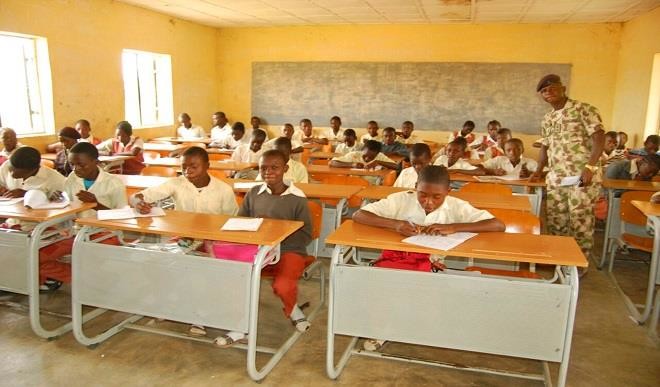Inside Plateau school where soldiers teach
Before 2012, there were over 500 pupils in Government Secondary School (GSS) Exland, Barkin Ladi local government area of Plateau State. At the peak of the crisis that engulfed the northern senatorial district, attacks and counter-attacks had forced families to desert their homes and turn refugees in nearby communities, especially around Riyom, Barkin Ladi and […]


Before 2012, there were over 500 pupils in Government Secondary School (GSS) Exland, Barkin Ladi local government area of Plateau State. At the peak of the crisis that engulfed the northern senatorial district, attacks and counter-attacks had forced families to desert their homes and turn refugees in nearby communities, especially around Riyom, Barkin Ladi and parts of Jos South.
Schools like GSS Exland with over 500 students suddenly had only 12 which subsequently prevented the school from registering for the West Africa Examination Council (WAEC) and the National Examination Council (NECO) in 2012. These years of hostilities reached a climax around Gashish and Exland, also called Gindin Akwati, when one Jeremiah Gyang who then taught Biology and Geography at Exland was killed in his home. That was the final straw that led most teachers to desert the area.
However, the academic environment is now getting a new lease of life. With improved security, communities are rebuilding their homes and pupils returning to school, thanks to a Strike Force Base stationed in the Gashish area by Operation Safe Haven (OPSH) in 2015. The rationale behind the base was to complement the efforts of Sector 7, Barkin Ladi and Force Operation Base (FOB) Kura Falls, in providing security and encouraging communities to return home and for pupils to make it back to school.
The soldiers, however, do not only provide security but render teaching services in some schools in the area. Our correspondent who visited one of such schools discovered men of OPSH, dressed in their uniforms, teaching subjects such as Mathematics, English, and Economics among others. In GSS Exland, apart from the school structure, the only government presence is the principal who is the only state government employee there. It was gathered from the dean of studies, John Nuhu Gyang, who acted on behalf of the principal, that the second government employee was away for further studies.
Presently, the school has about 250 students with close to a hundred writing the WAEC/NECO examinations. Gyang, who has taught in the school for 15 years, said there are about 12 contract teachers paid by the PTA, while five soldiers also render assistance in the school.
“I started teaching as a voluntary service. After the staff fled, I stayed back because this is my community. I taught the few students almost all the subjects. Gradually, I found others who could assist and the PTA decided to pay us a token for our efforts,” Gyang said.
OPSH Media and Information Officer, Captain Ikedichi Iweha said men of the task force will continue to teach in the schools until the state government assigns teachers to them.
“We are doing this to help improve the peace and encourage people to return to their homes. These children need to be in school and if there is anything we can do to help ensure that, we will,” Iweha said.
The PTA chairman for GSS Exland, Alhaji Shehu Abubakar, who spoke to our correspondent by phone, said for over 10 years, the PTA has been paying contract teachers because the number of staff has for a long time been inadequate.
“Right now we pay 14 staff, including a security man and a typist. The soldiers help us a lot and the class desks you see were donated to the school by a Good Samaritan. We have written to the government and we hope the present administration will heed to our cry and send teachers to us,” Abubakar said, adding that some of the soldiers are educationists.
“For instance, the commander of FOB Kura goes through a lot to select those who have teaching qualifications among the soldiers and posts them to teach in our schools. That has helped us a lot and we are grateful for such assistance,” he added.
Though the Plateau State government admitted to the inadequate number of teachers in the area, the Commissioner for Education, Alex Mairiga, who was represented by the Permanent Secretary, Education, Dr. Elias Pede, denied that soldiers were teaching in government schools.
Pede said apart from Exland, GSS Gashish also has three government teachers and 13 PTA staff, and that government was doing everything possible to recruit more teachers, including contract staff.
When asked how the state government feels about soldiers teaching in some of the schools, Pete insisted that there were no soldiers teaching in any of the schools despite the fact that a visit to one of the schools had shown the contrary.
